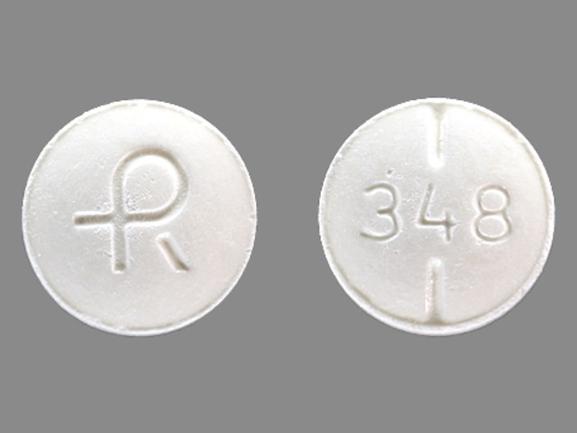Propylthiouracil
Generic name: propylthiouracil [ PRO-pil-THYE-oh-URE-a-sil ]
Dosage form: oral tablet (50 mg)
Drug class: Antithyroid agents
What is propylthiouracil?
Propylthiouracil is used to treat hyperthyroidism (overactive thyroid), Graves' disease, or toxic goiter (enlarged thyroid). propylthiouracil is sometimes given to control symptoms just before you undergo thyroid surgery or treatment with radioactive iodine.
Propylthiouracil may also be used for purposes not listed in this medication guide.
Propylthiouracil side effects
Get emergency medical help if you have signs of an allergic reaction (hives, difficult breathing, swelling in your face or throat) or a severe skin reaction (fever, sore throat, burning eyes, skin pain, red or purple skin rash with blistering and peeling).
Propylthiouracil can cause liver damage (especially during the first 6 months of treatment). Liver failure can be fatal or may require a liver transplant. Stop taking propylthiouracil and call your doctor right away if you have signs of liver damage:
-
nausea, vomiting, upper stomach pain;
-
itching;
-
fever, tiredness;
-
loss of appetite;
-
dark urine, clay-colored stools; or
-
jaundice (yellowing of the skin or eyes).
Also call your doctor at once if you have:
-
fever, chills, sore throat, mouth sores, feeling light-headed;
-
unusual bleeding;
-
purple or red discoloration of your skin;
-
skin rash, skin pain or swelling;
-
pink or dark urine, foamy urine, little or no urination;
-
shortness of breath, or if you cough up blood; or
-
new or worsening symptoms of lupus--joint pain, and a skin rash on your cheeks or arms that worsens in sunlight.
Common side effects of propylthiouracil may include:
-
nausea, vomiting, stomach pain;
-
itching or tingling, nerve pain;
-
joint or muscle pain;
-
swollen glands;
-
headache, drowsiness, dizziness;
-
swelling in your hands or feet;
-
decreased sense of taste; or
This is not a complete list of side effects and others may occur. Call your doctor for medical advice about side effects. You may report side effects to FDA at 1-800-FDA-1088.
Related/similar drugs
Warnings
Propylthiouracil can cause serious or fatal liver problems. Stop taking propylthiouracil and call your doctor right away if you have upper stomach pain, nausea, vomiting, loss of appetite, fever, itching, tiredness, dark urine, clay-colored stools, or yellowing of your skin or eyes.
Before taking this medicine
You should not use propylthiouracil if you are allergic to it.
Tell your doctor if you have ever had liver problems.
In very rare cases, propylthiouracil has caused liver failure and death in pregnant women during the second or third trimester of pregnancy. Tell your doctor if you are pregnant or plan to become pregnant.
Tell your doctor if you are breastfeeding.
Propylthiouracil may cause liver failure in children, but is sometimes used in children who cannot be treated with other medications. Do not give this medicine to a child without your doctor's advice.
How should I take propylthiouracil?
Follow all directions on your prescription label and read all medication guides or instruction sheets. Your doctor may occasionally change your dose. Use the medicine exactly as directed.
Propylthiouracil is usually taken 3 times per day.
You will need frequent blood tests to check your thyroid.
Call your doctor if you have unusual bruising or bleeding, or signs of infection (fever, chills, sore throat).
Tell your doctor if you have a planned surgery.
Store at room temperature away from moisture and heat.
What happens if I miss a dose?
Take the medicine as soon as you can, but skip the missed dose if it is almost time for your next dose. Do not take two doses at one time.
Get your prescription refilled before you run out of medicine completely.
What happens if I overdose?
Seek emergency medical attention or call the Poison Help line at 1-800-222-1222.
Overdose symptoms may include fever, chills, itching, upset stomach, nausea, vomiting, swelling, headache, or joint pain.
What should I avoid while taking propylthiouracil?
Avoid driving or hazardous activity until you know how propylthiouracil will affect you. Your reactions could be impaired.
What other drugs will affect propylthiouracil?
Tell your doctor about all your other medicines, especially:
-
digoxin (digitalis);
-
heart or blood pressure medication; or
This list is not complete. Other drugs may affect propylthiouracil, including prescription and over-the-counter medicines, vitamins, and herbal products. Not all possible drug interactions are listed here.
Popular FAQ
How does propylthiouracil work?
Propylthiouracil (PTU) works by blocking the production of the thyroid hormones thyroxine (T4) and triiodothyronine (T3) in the thyroid gland. It does this by interfering with the thyroid peroxidase enzyme, which normally aids in the incorporation of iodine into the thyroglobulin protein to form the thyroid hormones. Continue reading
More about propylthiouracil
- Check interactions
- Compare alternatives
- Pricing & coupons
- Reviews (4)
- Drug images
- Side effects
- Dosage information
- During pregnancy
- Drug class: antithyroid agents
- Breastfeeding
- En español
Patient resources
Professional resources
Related treatment guides
Further information
Remember, keep this and all other medicines out of the reach of children, never share your medicines with others, and use this medication only for the indication prescribed.
Always consult your healthcare provider to ensure the information displayed on this page applies to your personal circumstances.
Copyright 1996-2025 Cerner Multum, Inc. Version: 5.01.

